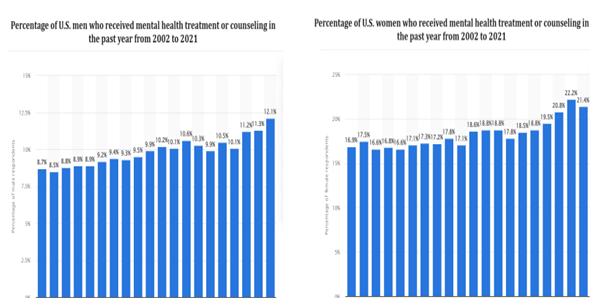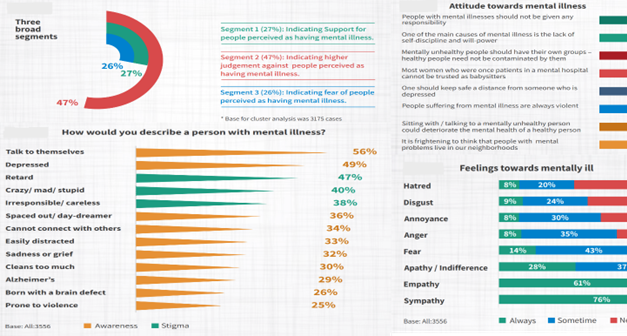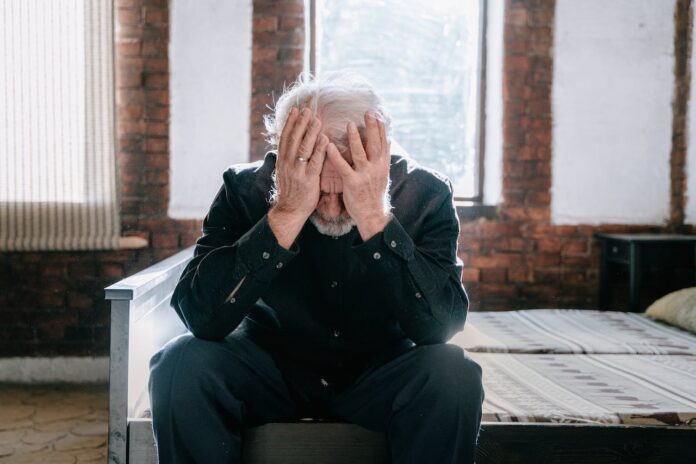The conversation about men and mental health has been long overdue. For generations, the traditional notions associated with masculinity have shrouded the emotional landscape of men in silence (Cofer, 2023). The idea of manliness has always been associated with the archetypes as being the stoic figure, the provider, the rock. These representations though commendable in various aspects, also create a suffocating cage around men’s mental well-being. The discussion about men and mental health is often shrouded in silence, which demands immediate attention. The issue of men’s mental health is deeply entrenched with antiquated ideas about gender. This aggravates their struggles and needs discussion to unravel the layers of complexities beneath the surface of men’s mental health (Amhf.org.au, 2023).
The Impact of Societal Expectations
Picture this young boy, just about old enough to navigate a bicycle without training wheels. He exudes boundless energy, harbours an insatiable curiosity about the world, and perhaps, harbours a slight apprehension about the shadows lingering beneath his bed. However, as the story unfolds, a shift occurs. Subtle cues and explicit messages begin to shape his understanding that “boys don’t cry,” genuine toughness defines “real men,” and any hint of vulnerability is meant to be concealed.
This invisible mould, forged by societal expectations, transforms into a burdensome weight. Expressing emotions extending beyond anger or pride seems perilous, akin to taking a blindfolded step off a cliff. Vulnerability, an intrinsic human need, becomes synonymous with weakness, and the simple act of seeking assistance can feel like a betrayal of the societal construct of “manliness.”
Men and Mental Health: Stark Figures
The statistics around men’s mental health paint a very stark and concerning image. Stigmas related to the mental health of men have a devastating impact on the lives of men with mental issues (Adaa.org, 2023). Here’s a crucial insight to grasp: confining one’s emotions doesn’t represent strength; rather, it’s a pressure cooker, waiting to explode. Research affirms that men, disproportionately, succumb to suicide, a stark reality often attributed to their reluctance to seek support (Rivers, 2023).
While 1 in 10 men experience depression or anxiety, only half of them will receive treatment. The suicide rates among men are nearly 4 times that of women (Mhanational.org, 2023). The symptoms of mental illness in men differ from those of women. Like 90% of patients diagnosed with schizophrenia below the age of 30, are men. Men are likely to report fatigue, irritability or loss of interest in work rather than feelings of sadness or worthlessness. A probable cause of why most cases of depression in men go unreported.
Men and Mental Health: A Pervasive Silence
Between 2002 to 2021, the number of men seeking counselling for mental health issues has increased. However, it is still considerably less when compared to several women seeking counselling for mental health issues. It is estimated that just 12.1% of men sought counselling or received mental health treatment compared to 21.4% of women (Statista.com, 2023).

Matters of the mind and men : India
The situation of men’s mental health issue in a country like India, which is largely a conservative society, is even more precarious. Nearly 70% of callers to the National mental health helpline in India, has been men. Government of India’s Social Justice and Empowerment Ministry launched a 24/7 helpline for mental health rehabilitation named KIRAN in September 2020 (Rakshit, 2021). Most callers since its launch have been men between age group 15-40 years. The major distress reported by the callers varied from anxiety to depression. Callers also reported suicidal tendencies and substance abuse issues. Callers reported that, stigma associated with mental health issues in Indian society was the biggest hindrance for them to seek medical help.
An ICMR study noted that heath issues in men in India largely gets unreported. Majority of men try to hide depression with alcohol. The prevalence of alcohol use disorder in Indian men was 9% as against 0.5% in Indian women (Madhukar, 2023). Overall mental morbidity was also higher among Indian men at 13.9% as compared to Indian women at 7.5%.
The charts below highlight the perceptions associated with mental health in India

According to a Lancet study conducted by Rice et al. (2021), sex differences in mental health generally appear in late childhood and adolescence. The authors also noted that it is at this time that gender notions are entrenched. These notions persist in later life, where they continue to shape the mental health and help-seeking attitude. McKenzie et al. (2022), noted that men who internalize stigma are less likely to get help for their psychological issues. This group of men were found to have a heightened risk of severe mental illness.
Conclusion: A Call to Action for Men’s Mental Health
Let’s break down the wall between men and mental health! These stats and research scream for action. Here’s what we can do:
- Eradicate the stigma: Start having open dialogues, show men struggling with their mental health on television, and educate everybody that asking for help doesn’t mean being weak but rather strong.
- Enhance accessibility to support: Stop unnecessary, painful visits in clinics or endless waiting queues. Adopt telehealth, group meetings, and specifically designed areas for men, where searching for assistance is easy like having a drink.
- Foster a sense of camaraderie: Men require a supportive community! Let us encourage men into online friendships and playing and participation in games, or even into local sports team playing and participation; that is when let them talk about their experience and understand that they do not feel they’re lonely.
- Invest in forthcoming research: Act as a scientist who is decrypting some complicated code, channelling more of its resources into extra research ventures. However, a deeper understanding of men’s mental health will always improve our chances of promoting their social welfare.
Collectively, we can dismantle the shackles of stigma, construct avenues for support, and underscore to men the significance of prioritizing their mental health. Let’s embark on this endeavour together.
Here, is a Ted-Ex talk by Henry Nelson on Breaking the Silence: Why Men Need to Talk About Their Mental Health:





